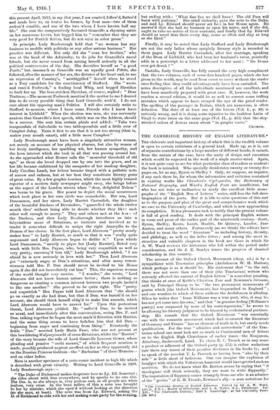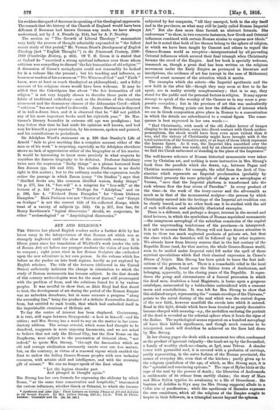THE CAMBRIDGE HISTORY OF ENGLISH LITERATURE.•
THE elaborate and important history of which this is the twelfth volume is open to certain criticisms of a general kind. Made up, as it is, out of separate contributions by a large number of different hands, it cannot, from the nature of the case, have the unity of design and execution which would be expected in the work of a single master-mind. Again, it is not quite easy to see for what particular class of readers or students the book is intended. Who specially desiderates twenty or twenty-five pages on, let us say, Byron or Shelley ? Only, we suppose, an inquirer, if any such there be, for whom the information and criticism contained in existing works like Chamberee Cyclopaedia, tho Dictionary of National Biography, and Ward's English Poets are insufficient, but who has not time or inclination to study the excellent little mono- graphs of the " English Men of Letters " series, still less the full-dress biographies of the poets. But it is idle to raise questions of this sort as to the purpose and plan of the great and comprehensive work which we owe to the University of Cambridge, and which is now approaching its completion. It is a pleasanter task to testify that the present volume is full of good reading. It deals with the principal English writers in verse and prose of the earlier part of the nineteenth century--Scott, Byron, Shelley, Keats, Lamb, Hazlitt, De Quincey, Lander, Jane Austen, and many others. Fortunately (as we think) the editors have decided to treat the word " literature " as including history, divinity, and philology, as well as the belles lettres ; and among the most in- structive and valuable chapters in the book are those in which Sir A. W. Ward reviews the historians who fall within the period under consideration, and Sir J. E. Sandys traces the progress of classical scholarship in this country.
Tho account of the Oxford Church Movement (chap. xii.) is by a sympathizer with Tractarian principles (Archdeacon W. H. Hutton), which perhaps is as it should be. His statement that " to the end, there was not more than one of their [the Tractarian] writers who seriously affected the current of English letters " is somewhat puzzling. One thinks at once of Keblc's Christian l' ear and Newman's Sermons, said by Principal Shairp to be " the two permanent monuments of genius which [the Oxford Movement] has bequeathed to England " ; and one wonders to which of these authors the Archdeacon is alluding. When he writes that " Isaac Williams was a true poet, who, it may be, has not yet come into his own," and that " in genuine feeling [Williams's poetry] was surpassed by none of his contemporaries," he seems to be allowing his literary judgment to be biassed by ecclesiastical partisan- ship. His remark that the Oxford Movement " was essentially ono with the romantic movement which had re-created the literature of Germany and France " has an element of truth in it, but surely needs qualification. For the true " affinities and antecedents " of the Trac- tarian school one must look not so much to Continental men of letters as to the English High Churchmen of earlier times—the Nonjurors, Atterbury, Sacheverell, Laud. To claim R. C. Trench as in any sense a product or adherent of the Oxford party (p. 272) is rather audacious (aro there any traces of their peculiar doctrines in his books ?) ; and to speak of the novelist T. L. Peacock as having been " also by their side " is little short of ludicrous. One can imagine the explosion of laug,h,ter with which the Voltaircan humorist would have greeted Buchan assertion. We do not know what Mr. Hutton means by saying that " if theologians still think seriously, they are wont to write flippantly." The imputation of flippancy comes strangely from one who is an admirer of the " genius " of R. H. Froude, Newman's ally—a man notorious for • The Cambridge Iliatory of English Literature. Edited by Sir A. W. Ward, Litt.D., F.D.A., Master of Peterhouse, and A. It. Waller, MA., Peterhouse. Vol. XII., "The Nineteenth Ceutary," Part I. Cambridge: at the University Press.
Rs. net.]
his reckless disregard of decorum in speaking of his theological opponents. The remark that the history of the Church of England would have been different if Newman had known German wae made, we have always understood, not by J. A. Fronde (p. 254), but by A. P. Stanley.
The section on " The Growth of Liberal Theology " summarizes very fairly the process of thought admirably expounded in " the fullest recent study of this period," Mr. Vernon Store's Development of English Theology [not " English Thought "] in the Nineteenth Century, 1800- 1860 (Cambridge History, p. 464). Of T. H. Green it is stated that at Oxford he " exercised a strong spiritual influence over those whom criticism was compelling to discard the fair humanities of old religion.'" A discussion of Green's metaphysics could not reasonably be looked for in a volume like the present ; but his teaching and influence, as hearers or readers of his sermons on " The Witness of God " and " Faith " know, were at least as much theological as philosophical ; and a fuller account of his religious views would have been welcome. It may be added that the Coleridgean line about " the fair humanities of old religion " is not very happily chosen to describe those parts of the fabric of traditional orthodoxy—such as the doctrine of the vicarious atonement and the damnatory clauses of the Athanasian Creed—which " criticism " has most tended to discredit. James Martineau is disposed of in half-a-dozen lines, and it is observed that he " did not publish any of his more important books until his eightieth year." Dr. Mar- tinean's literary fecundity in extreme old age was prodigious ; but long before that time he had made his opinions well known, and had won for himself a great reputation, by his sermons, spoken and printed, and his contributions to periodicals.
Sir Adolphus Ward's statement on p. 320 that Stanley's Life of Arnold " fails to give anything like a complete account either of the man or of his work " is surprising, especially as Sir Adolphus elsewhere shows no lack of appreciation either of the biographer or of his master. It would be interesting to know more precisely in what respects he considers the famous biography to be deficient. Professor Saintsbury twice uses the expression " flashy things " as a phrase borrowed from Ben Jonson (pp. 105 and 224). The erudite Professor is no doubt right in this matter ; but to the ordinary reader the expression recalls rather the passage in which Bacon (essay " On Studies ") says that " distilled books are, like common distilled waters, flashy things." On p. 177, line 14, " fore-will " is a misprint for " free-will," at the bottom of p. 245 " Augustus " Trollope for " Adolphus," and on p. 286, line 4, "Richard Denn Hampden " for "Rena Dickson Hampden." Mark Pattison aas not "Rector of Exeter," and "Essays on Scaliger " is not the correct title of his collected Essays, which treat of a variety of subjects (p. 333). On p. 317, first line, Sir Henry Rawlinson's " logical discoveries " should, we conjecture, be either " archaeological " or " Assyriological discoveries."































 Previous page
Previous page